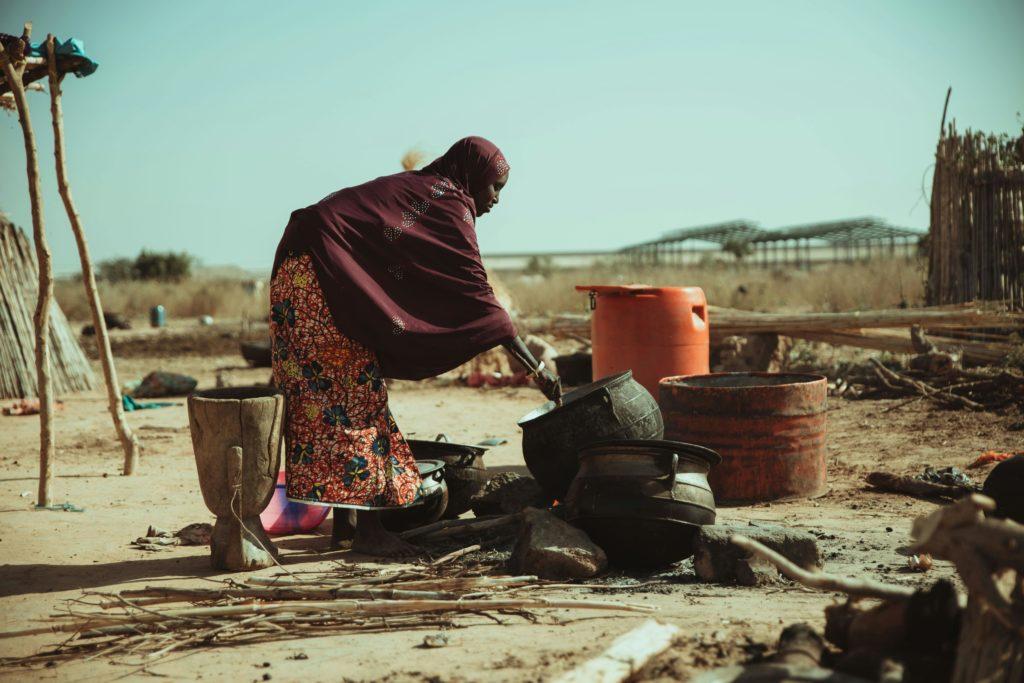
When Sunda goes to prepare dinner for her family, she first goes to a nearby bush to forage for wood or animal dung to use as cooking fuel. After hours pass, she decides she has enough, so she walks home and begins building a fire in the cooking pit. She asks her son to go to the community spicket to collect water to boil for today’s meal and for drinking water. By the time she’s getting the water boiling and is preparing food, the kitchen is filled with smoke. Sunda knows smoke is not good for her, but she needs to make a meal for her hungry family, so she coughs it away knowing she’ll soon step out of the smoke to get fresh air. Years later she begins suffering from chronic bronchitis. Her community doctor later tells her the smoke and air pollution from these dirty cooking fuels was to blame.
As is clear from the above short story, by fulfilling her household duties in an energy poor environment, Sunda’s health has been damaged. Sadly, this is the case for many women and girls, particularly in Africa and across the Global South where energy poverty is rampant and women carry the responsibility for cooking (and other household duties) according to traditional gender norms.
Worldwide, 2.3 billion people are using highly polluting cooking methods because they lack access to clean cooking facilities. Around half of them come from Africa: according to the International Energy Agency (IEA), four out of five Africans still cook over open fires and traditional stoves. In 2022 alone, 3.2 million deaths worldwide were attributable to this household air pollution. As many African women remain at home to cook and fulfill household duties, they account for over 60% of the deaths from household air pollution.
So let’s be clear: African women, who are ‘in the line of fire’ (pun intended) on this issue, must be involved in the development of a clean cooking and energy solution for all.
The 1st Clean Cooking in Africa Summit
For the first time, some these concerns were addressed at the Clean Cooking in Africa Summit held in Paris on May 14th this year. Hosted by the IEA, this summit aimed to develop a roadmap for ‘delivering universal clean cooking in Africa’ by joining government leaders with development, energy, and financial institutions from around the world to discuss and design a plan. While community development and ‘universal access to affordable, reliable and sustainable energy’ seemed to be the ultimate objectives, gender equality was also raised as a key consideration. Members of the summit agreed that women must be involved in these efforts to safeguard a gender-just energy transition throughout.
But let’s first zoom in a bit on what energy poverty for (too) many African women implies. Energy poverty is ‘a household’s lack of access to essential energy services that underpin a decent standard of living and health’. Energy poor individuals do not have access, or have limited use of electricity and other forms of energy. Consequently, in these households tasks are much more mentally and physically demanding. In most of these settings, holding onto traditional gender roles is essential to the functioning of the family. For women and girls, household duties like cooking thus take priority. Energy poverty has far reaching consequences on women and girls, including in the long term: because they largely have to focus on the needs of the household, their agency to pursue educational or career opportunities is limited. The effects of energy poverty are thus not only disproportionately harming women’s health, energy poverty is also perpetuating gender inequalities and further entrenching gender norms into these environments.
However, women themselves may be what is needed to stop this vicious cycle of energy poverty: by improving education and employment opportunities for women and giving them the agency to participate in society, their contributions can promote economic and societal development (as has been proven time and time again).
Women may thus be the key to reducing energy poverty and increasing access to sustainable energy sources. Which is why it was a shame that African women only represented 17% of stakeholders at this initial summit in Paris – even if African women’s voices are being championed in this initiative.
Also, while everybody at the summit agreed on the need to wean African households off traditional dirty fuels such as charcoal, kerosene and firewood, there was less agreement on efforts to switch them to fossil fuel gas (certainly among activists). Cleaner, more sustainable, and affordable sources of fuel are plentiful in Africa, however. It seems powerful investors may have swayed opinions…
On a more positive note, the summit culminated with the formulation of the Clean Cooking Declaration signed by public and private stakeholders from around the world. In it, they mobilized an initial $2.2 billion for this energy transition program and access to clean sustainable and affordable cooking in Africa. Still falling short of the $4 billion a year needed for the rest of this decade, but a good start nevertheless.
In short, this international summit has set in motion an actionable plan to a problem that has been pondered for decades now. Although the current momentum is promising, for the time being the plan doesn’t go far enough in terms of commitments to protect the environment, climate health, and gender equality.
A lot more will be needed to truly end energy poverty for women in Africa. So let’s put them in the lead.
Great topic, great article!